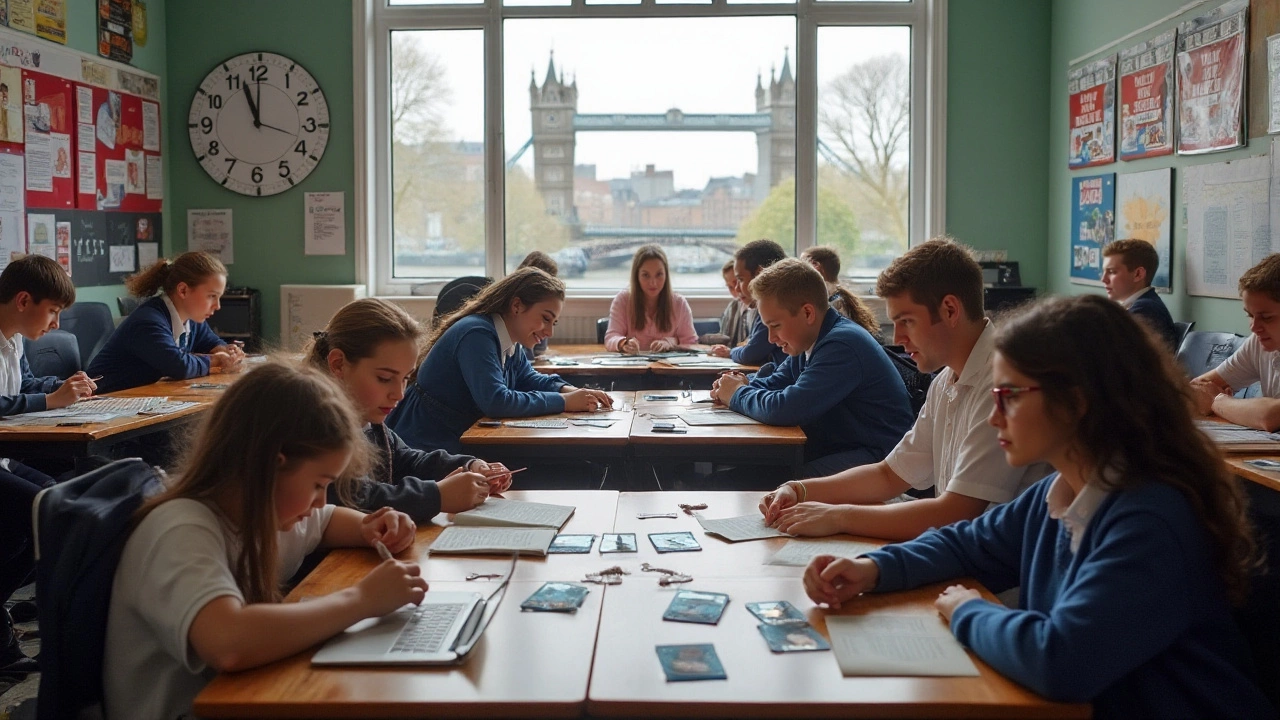The countdown to GCSE exams can be a daunting time for students, especially when the pressure mounts to cover a vast syllabus in a limited timeframe. Often, the question arises: is four weeks enough to prepare effectively? While it might seem overwhelming, with the right approach, four weeks can be a fruitful period for revision.
This article delves into the strategies and methods to make those four weeks count, ensuring that students not only cover essential content but also build the confidence needed to excel. By understanding one's learning style and implementing targeted study techniques, pupils can transform revision from a burdensome task into an empowering journey towards academic success.
- Understanding the Examination Scope
- Creating a Tailored Revision Schedule
- Identifying Your Learning Style
- Utilizing Effective Study Techniques
- Managing Stress and Staying Motivated
- Assessing Progress and Adapting Strategies
Understanding the Examination Scope
The first step in approaching any revision process effectively is to gain a crystal-clear understanding of the examination scope. Knowing what the exam entails not only guides you on what to revise, but it also helps you avoid the trap of wasting precious time on irrelevant topics. Begin by reviewing the exam syllabus provided by your examination board. This document is your roadmap to success, outlining every topic that could potentially appear on the test. For students preparing for their GCSEs, it's important to sift through the core subjects like English, Maths, and Science to pinpoint specific focus areas. A deep dive into past examination papers can reveal recurring themes and popular question types, offering invaluable insights into what the examiners might favor.
Moreover, understanding the examination scope means recognizing the weight each topic carries within the larger framework of the examination. Some subjects might allocate more marks to a particular theme, suggesting it requires more of your attention during the revision. Create a prioritized list of topics based on the mark distribution, ensuring you spend time wisely according to the significance of each section. Statistics suggest, for instance, that in Mathematics, topics such as algebra and geometry consistently command a substantial portion of the exam. Thus, brandishing a focus on these areas could yield better results.
To streamline your revision planning, categorize subjects into areas where you feel most confident and those that require further improvement. This categorizing should play a central role in how you allot your revision time. Katherine Birbalsingh, a renowned educationalist, once remarked,
"Knowing your limits is the first step to defining your strengths."With this in mind, understanding your weaknesses in the context of the exam scope can turn perceived limitations into strengths through targeted practice.
Lastly, technology can be a helpful ally in wrapping your mind around the examination scope. There are several apps and online platforms that offer customizable syllabi breakdowns and tailored study guides based on past exam trends and individual student needs. These resources provide a structured approach to identifying the key areas you'll need to cover in your studies. By embracing these resources early in your revision period, you can elevate your confidence, setting a solid foundation for your GCSE revision journey.
Creating a Tailored Revision Schedule
Planning a revision schedule tailored to your individual needs is one of the most critical steps in preparing for your GCSE exams. To kick things off, the very first thing you should do is to map out all your subjects. By listing them, you can gauge which subjects require more attention based on your strengths and weaknesses. Each subject will have varying depths and intricacies; therefore, reviewing the syllabus for each will help prioritize your workload. It’s important to allocate more time to topics that you find particularly challenging. However, be sure not to neglect your stronger areas completely, as a balanced approach is most effective for comprehensive preparation.
Next, break down your four-week timeline into smaller, manageable units. A good practice is to organize your study sessions on a weekly basis. Design each week with specific goals for each subject. Within a single week, aim for variety by dedicating different days to different subjects. This will keep your mind engaged and reduce fatigue. Remember, the goal isn’t to cram everything in massive blocks but to space out your learning in systematic ways that align with cognitive science principles of frequent, shorter study periods leading to better retention. In fact, research has shown that "spaced repetition" aids significantly in memorization and understanding.
Utilizing Unplanned Time Effectively
While it’s essential to have a structured plan, leave some wiggle room for the unexpected. Life, after all, doesn’t always cooperate with our schedules. Building in buffer days allows flexibility for days when concentration might wane or when external factors disrupt your plans. On such days, nurturing your mindset is crucial, as stress can often derail motivation. Knowing you have contingency time minimizes anxiety and keeps you on track.
"Failing to plan is planning to fail," remarked Benjamin Franklin, underscoring the importance of forethought and strategy in achieving success.
In terms of daily routine, aim to start your most challenging subject first when your mind is fresh. Save easier or more enjoyable subjects for later in the day. Don’t overlook the significance of proper breaks; they are not wasted time but rather essential to gear up for subsequent sessions. A recommended practice is the Pomodoro Technique, where you work in short bursts with scheduled breaks between. Employing this method not only improves focus and stamina but also guards against burnout.
Technology can be a helpful ally in this process. There are numerous apps available that can assist in creating a personalized schedule. Tools like Google Calendar or specialized educational apps can remind you daily of what’s on the agenda. In addition, they can track your progress, offering a visual representation of what you've accomplished, which can greatly boost motivation. Remember, a successful revision schedule is adaptable. Monitor your progress honestly and be willing to adjust your timings and methods based on results. The optimization of your study planning process leads to better outcomes and makes studying a more enriching experience rather than a monotonous task.

Identifying Your Learning Style
One of the most pressing challenges faced during GCSE revision is understanding how you absorb information best. Each student is unique, and their path to mastering concepts lies in recognizing and harnessing their individual learning style. There are three primary types commonly identified: visual, auditory, and kinesthetic. While some might find a balance among them, others might lean heavily towards one. It is crucial to note there's no 'right' or 'wrong' style; knowing yours can make your revision significantly more effective and less stressful.
Visual learners process information best through images. They thrive on *charts*, maps, and diagrams. If this resonates with you, try incorporating colorful mind maps or flowcharts into your study sessions. Websites offering interactive diagrams can also be particularly helpful. For example, a complex historical timeline can become much clearer when visualized graphically. Visual learners benefit greatly from organizing material into visually appealing formats and can reinforce their learning by watching educational videos on platforms like YouTube or Khan Academy.
Auditory learners, on the other hand, excel when listening. Discussions, lectures, and even educational podcasts help these students. If you recognize yourself in this category, consider recording your notes and listening to them repeatedly during walks or downtime. Engage in study groups where you can discuss topics aloud to deepen understanding. Studies have shown that auditory repetition can aid in the retention of critical information significantly. Even reading your notes out loud can provide the auditory input needed to grasp tricky subjects.
Kinesthetic learners prefer a hands-on approach to studying. They benefit most from involving physical activity in their learning process. If you belong to this category, strive to connect abstract concepts with physical actions or real-world experiences. This could mean conducting science experiments, role-playing historical events, or using flashcards in physically engaging ways. For kinesthetic learners, the act of doing is the key to comprehension. Writing and rewriting notes, doing practice papers, and even pacing while reciting information can link mental activities with muscle movement to solidify learning.
Effectively, decoding your learning style empowers you to select study techniques that align with how your brain prefers to work, optimizing your preparation for GCSE exams. Beyond these styles, some people might find they blend characteristics from multiple categories. Explore different methods and notice which yields the best retention and understanding. This is a journey of self-discovery as much as it is about academic preparation. As the educational theorist David A. Kolb beautifully puts it,
“Learning is the process whereby knowledge is created through the transformation of experience.”Recognizing this transformation is what personalizes your revision, making it an engaging, effective process instead of a mere exercise in memory.
Utilizing Effective Study Techniques
When diving into the art of effective revision, students often find themselves overwhelmed by where to start. However, understanding and applying proven study techniques can significantly enhance the quality and efficiency of the time spent revising. It's not just about cramming information, but engaging with the material in a way that fosters deep understanding and recall. Let's explore some of these tested methods that can turn those four weeks into a powerhouse of productivity.
One cornerstone approach is active recall. It involves actively stimulating memory during the learning process, which contrasts with passive review. By consistently quizzing yourself on the material, rather than just reading or highlighting, your brain is pushed into overdrive, making neural connections stronger. This method, coupled with spaced repetition — reviewing information at increasing intervals — is a scientific way of ensuring that data is transferred from short-term to long-term memory.
Another highly effective technique is the use of mind maps. These visual aids help in organizing information in a structured format, allowing the brain to create a visual framework of the topics. As you create these maps, you're not just memorizing facts, but also understanding the relationships between different pieces of information. It's a process that enhances creative thinking and problem-solving skills, which are invaluable for exam scenarios.
"The most powerful learning strategies often involve students generating ideas, retrieving information from their memory, exploring concepts in different formats, and evaluating their understanding in a sustained, iterative cycle." — Dr. Robert Bjork, cognitive psychologist
Don't underestimate the power of study groups either. The social dimension of learning can make a substantial difference. Explaining concepts to peers solidifies your own understanding because you have to process the information at a deeper level to translate it into coherent words. This also provides opportunities for motivation and variety in what can sometimes be a solitary routine.
When it comes to managing time and maximizing GCSE revision, the Pomodoro Technique offers a simple yet effective strategy. By working in blocks of 25 minutes, followed by a five-minute break, students can maintain high levels of concentration without succumbing to fatigue. This method breaks the monotony and refreshes the mind, making study sessions more productive. Try it and see how it revolutionizes your approach.
An often overlooked aspect is the environment where studying takes place. A clutter-free, well-lit space can have profound effects on concentration and stress levels. Background noise can be distracting, so consider using noise-canceling headphones or soothing music to create a conducive atmosphere for learning. Physical well-being is equally important; ensuring adequate sleep and nutrition can keep cognitive functions at their peak.
Implementing a mix of these strategies not only enhances efficiency but also makes revision a more engaging and less daunting task. The key is to remain flexible, adjusting techniques as necessary based on personal experiences and outcomes. With diligence and the right methods, mastering your exam tips can become an achievable target, turning potential stress into a journey of self-improvement and academic success.

Managing Stress and Staying Motivated
Preparing for GCSE exams often feels like juggling a variety of weights, each representing different subjects, all demanding your attention. The weeks leading up to the exam can be fraught with stress and anxiety. Understanding the mental pressures associated with this period is crucial. Research shows that about 83% of students report feeling stressed by exams—a staggeringly high number that cannot be ignored. But stress isn’t just a byproduct of looming deadlines; it’s also fueled by uncertainty and the perceived need to be perfect. Learning to manage these feelings is essential not only for your mental well-being but also for academic success.
Starting with stress management, it's important to adopt techniques that help diffuse anxiety. Breathing exercises are a simple yet effective method employed by many. When stress levels peak, taking a deep breath can work wonders. Close your eyes, breathe in slowly, hold it for a few seconds, and release the tension with a long exhalation. Doing this several times helps calm the nervous system. A popular technique among students is the 4-7-8 breathing method. In addition, regular physical activities such as jogging or yoga sessions can have a profound impact. Exercise is known to release endorphins, which naturally boost your mood and energy levels—important allies during the revision period.
Concurrently, staying motivated across these four weeks calls for actionable strategies. Break your GCSE revision time into manageable chunks using the Pomodoro Technique, which involves 25 minutes of focused study followed by a 5-minute break. This approach maximizes efficiency while preventing burnout. As the end of each week approaches, reward yourself to maintain a positive outlook towards your studies. Even simple incentives, like watching your favorite show or having a treat, can be powerful motivators. Reflect regularly on your goals, and remind yourself why you're working so hard. Whether it’s achieving a top grade or gaining entry to your preferred college, keeping your eyes on the prize can fuel your drive.
Peer support should not be underestimated either. Studying with friends, though potentially distracting, offers a valuable opportunity to share insights and calm each other's nerves. Seeing others cope can sometimes be reassuring and can provide tips and approaches you haven't considered. It fosters a sense of camaraderie that can lighten the burden of exam preparation.
Establishing a structured routine can instill a sense of order and simplify your day-to-day progress. A study schedule crafted to tackle subjects and topics systematically not only makes the workload seem less daunting but also ensures all areas are covered. However, be flexible. Allow for adjustments when topics take longer than anticipated and be kind to yourself on days when motivation seems just out of reach. Success lies in persistence, not perfection.
"The greatest glory in living lies not in never falling, but in rising every time we fall." - Nelson Mandela
This poignant reminder from Mandela applies equally to handling stress and maintaining motivation. Remember, exams are not just a test of knowledge but also a journey of perseverance. Embrace this journey thoughtfully and with resilience, knowing that trials today lay the foundation for triumphs tomorrow.
Assessing Progress and Adapting Strategies
As you navigate through your GCSE revision journey, it's crucial to frequently assess your progress to ensure you're on the right track. Revisiting your performance longer into the process helps in identifying areas that may need more attention and supports effective time management. Embarking on evaluations can seem cumbersome, but they provide essential insights into the effectiveness of your study methods. Developing a habit of weekly self-assessments can help maintain focus and guide necessary adjustments in your study plan. These assessments not only highlight weaknesses but also reinforce your strengths, providing a balanced view of your preparation status. By engaging in self-reflection, students can gain a clearer understanding of their understanding level regarding each subject. This approach also promotes accountability, as students are more likely to adhere to their revision plans when they track their progress regularly. Moreover, consistent assessments make adapting strategies a much smoother process, paving the way to a successful exam season.
Incorporating a few tried and tested strategies can be valuable for monitoring your progress efficiently. An effective method is the use of mock exams, which simulate actual exam conditions and offer a realistic gauge of your current preparedness. These practice tests allow you to experience the pacing and pressure similar to an exam setting, honing your time management and helping alleviate exam anxiety. Align these mocks with the topics you’ve revised to get a more accurate picture of your knowledge retention and application skills. Another handy tool is revision trackers, which are simple yet powerful aids in documenting what you’ve covered and identifying gaps. Tracking your revision can easily highlight patterns in your study habits that need tweaking to boost productivity.
"Success is the sum of small efforts, repeated day in and day out." – Robert CollierBy combining these strategies with regular feedback from teachers or peers, you can fine-tune your revision approach, emphasizing areas that promise the greatest return on investment.
Adaptability is key in transforming feedback into action. As you collate data from assessments, be open to shifting your focus and timelines to maximize your learning potential. Every student's journey is unique, thus requiring a personalized approach to revising. Students can particularly benefit from creating a flexible schedule that accommodates these spontaneous shifts. Implementing varied study techniques, such as active recall or spaced repetition, can also boost memory retention and cater to different learning modes. Technology can be a significant ally here, with countless resources like quiz apps and online study sessions available for students to utilize. Yet, it's essential not to succumb to information overload; instead, cultivate a balanced digital diet to remain productive and engaged. Always remember, adapting strategies is an ongoing process and doesn't end until the exams are over. Continuing to refine and adjust your approach right up until exam day will keep you sharp and motivated.






